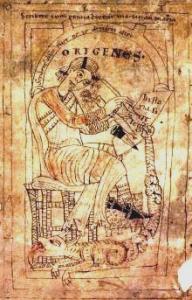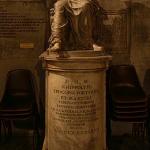“Please Hit ‘Subscribe’”! If you’ve received benefit from this or any of my 4,500+ articles, please follow this blog by signing up (email address) on the sidebar to the right, above the icon bar, “Sign Me Up!”: to receive notice when I post a new blog article. This is the equivalent of subscribing to a YouTube channel. Please also consider following me on Twitter / X and purchasing one or more of my 55 books. All of this helps me get more exposure and concretely supports my full-time apologetics work. Thanks so much and happy reading!
*****
For the very essential righteousness is Christ, Who was made to us of God wisdom and righteousness and sanctification and redemption.
But from that righteousness is formed the righteousness which is in each individual, so that there are in the saved many righteousnesses, whence also it is written, For the Lord is righteous, and He loved righteousnesses.
(Commentary on the Gospel of John, Bk. VI, 3)
The deeds of both a good and an evil man pass away, but they shape and construct the mind of the doer according to their respective quality and leave it either good or bad and accordingly destined to receive either punishment or rewards. (Commentary on Romans [2:2]; in Gerald Bray, editor, Ancient Christian Commentary on Scripture: New Testament VI: Romans [Downers Grove, Illinois: InterVarsity Press, 1998], 53)
Now let us consider what is meant by the just judgment of God, in which he will reward each one according to his works. First of all we must reject the heretics who say that souls are good or evil by nature and maintain instead that God will reward each one according to his deeds and not according to his nature. Second, believers are to be instructed not to think that it is enough merely to believe [lacking fruit]; they ought to realize that the just judgment of God will reward each one according to his works. (Commentary on Romans [2:5]; in Bray, ibid., 57-58)
If the containment of evil which circumcision signifies is not matched by works of faith, it is regarded as a form of wickedness. Even in the church, if someone is ‘circumcised’ by the grace of baptism and then becomes a transgressor of the law of Christ, the circumcision of baptism is reckoned to him as uncircumcision, because “faith without works is dead”. (Commentary on Romans [2:25]; in Bray, ibid., 76)
Let no one think that someone who has faith enough to be justified and to have glory before God can at the same time have unrighteousness dwelling in him as well. For faith cannot coexist with unbelief, nor can righteousness with wickedness, just as light and darkness cannot live together. (Commentary on Romans [4:2]; in Bray, ibid., 109-110)
. . . the apostolic teaching is that the soul, having a substance and life of its own, shall, after its departure from the world, be rewarded according to its deserts, being destined to obtain either an inheritance of eternal life and blessedness, if its actions shall have procured this for it, or to be delivered up to eternal fire and punishments, if the guilt of its crimes shall have brought it down to this: . . . (De Principiis, Preface, 5)
Let us observe also, that the Apostle Paul addresses us as having power over our own will, and as possessing in ourselves the causes either of our salvation or of our ruin [cites Rom 2:4-10] . . . You will find also innumerable other passages in holy Scripture, which manifestly show that we possess freedom of will. Otherwise there would be a contrariety in commandments being given us, by observing which we may be saved, or by transgressing which we may be condemned, if the power of keeping them were not implanted in us. (De Principiis, Bk. III, ch. 1, 6)
. . . the providence of God, which equitably administers all things, governs also immortal souls on the justest principles, (conferring rewards) according to the merits and motives of each individual; the present economy of things not being confined within the life of this world, but the pre-existing state of merit always furnishing the ground for the state that is to follow, and thus by an eternal and immutable law of equity, and by the controlling influence of Divine Providence, the immortal soul is brought to the summit of perfection. (De Principiis, Bk. III, ch. 1, 17)
. . . the human will alone is not sufficient to obtain salvation; nor is any mortal running able to win the heavenly (rewards), and to obtain the prize of our high calling of God in Christ Jesus, unless this very good will of ours, and ready purpose, and whatever that diligence within us may be, be aided or furnished with divine help. . . . So also in the race of our life we ourselves must expend labour, and bring diligence and zeal to bear; but it is from God that salvation is to be hoped for as the fruit of our labour. Otherwise, if God demand none of our labour, His commandments will appear to be superfluous. . . . And in the matter of our salvation, what is done by God is infinitely greater than what is done by ourselves . . . (De Principiis, Bk. III, ch. 1, 18)
. . . those who could not otherwise than by obedience obtain salvation. (De Principiis, Bk. III, ch. 5, 6)
Now the expression, In the image of God created He him,
without any mention of the word likeness, conveys no other meaning than this, that man received the dignity of God’s image at his first creation; but that the perfection of his likeness has been reserved for the consummation — namely, that he might acquire it for himself by the exercise of his own diligence in the imitation of God, the possibility of attaining to perfection being granted him at the beginning through the dignity of the divine image, and the perfect realization of the divine likeness being reached in the end by the fulfilment of the (necessary) works. (De Principiis, Bk. III, ch. 6, 1)
. . . some of them have lived in a condition of degradation owing to their sins, while others have been called to a state of happiness on account of their merits; . . . (De Principiis, Bk. III, ch. 6, 6)
Related Reading
*
***
*
Practical Matters: Perhaps some of my 4,600+ free online articles (the most comprehensive “one-stop” Catholic apologetics site) or fifty-five books have helped you (by God’s grace) to decide to become Catholic or to return to the Church, or better understand some doctrines and why we believe them.
Or you may believe my work is worthy to support for the purpose of apologetics and evangelism in general. If so, please seriously consider a much-needed financial contribution. I’m always in need of more funds: especially monthly support. “The laborer is worthy of his wages” (1 Tim 5:18, NKJV). 1 December 2021 was my 20th anniversary as a full-time Catholic apologist, and February 2022 marked the 25th anniversary of my blog.
PayPal donations are the easiest: just send to my email address: [email protected]. Here’s also a second page to get to PayPal. You’ll see the term “Catholic Used Book Service”, which is my old side-business. To learn about the different methods of contributing (including Zelle), see my page: About Catholic Apologist Dave Armstrong / Donation Information. Thanks a million from the bottom of my heart!
*
***
Photo credit: Origen; manuscript from Schäftlarn (ca. 1160) of In numeros homilia XXVII., München, Bayerische Staatsbibliothek, clm 17092, fol. 130v, cf. Elisabeth Klemm: Die romanischen Handschriften der Bayerischen Staatsbibliothek, part 2. Die Bistümer Freising und Augsburg, verschiedene deutsche Provenienzen. Textband. Reichert, Wiesbaden: 1988, Nr. 111, p. 90. [source] [public domain/ Wikimedia Commons]
Summary: Origen (c. 185 – c. 253), like all of the Church fathers (as Protestant historians tell us), denied the 16th century novel Protestant doctrine of “faith alone” or “sola fide.”














